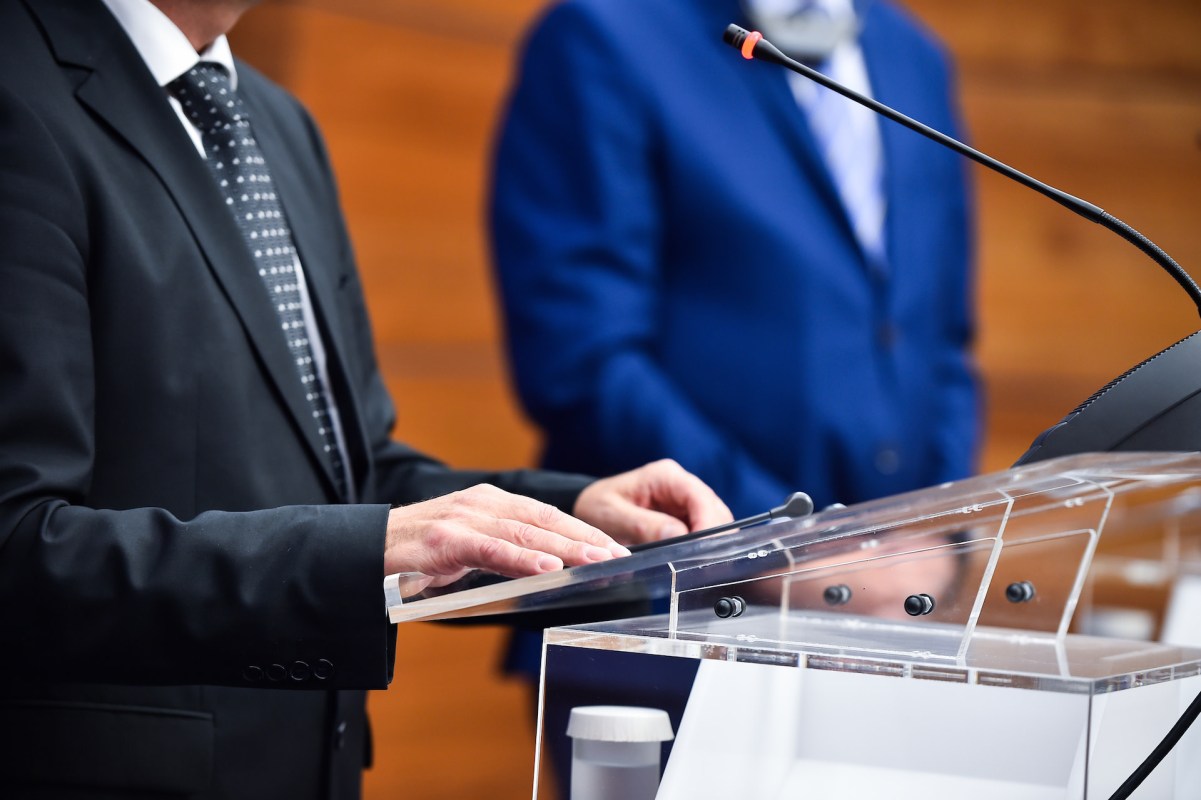"For too long, conservatives have run from the climate conversation. Help me reverse the narrative that somehow we don't care about this Earth."
That was the plea from Republican congressman John Curtis at the Conservative Climate Summit, a sold-out event in his home state of Utah, that focused on a conservative approach to climate solutions.
"I have no doubt that decades from now," Curtis told the crowd in Orem, "you will be telling your children that you were here when it all started."
Curtis recruited several of his congressional colleagues to share their "climate journeys" and to talk about an issue that, he said, often makes Republicans "break out in a cold sweat, makes your chest tighten."
But, talking "from my heart," he asked the audience on both sides to show up with "an open mind."
"There's no debate that less pollution is better than more pollution, that less plastic is better than more plastic in our oceans, and yet, we often line up on sides and call the other side crazy. Unfortunately, that's much of our climate dialogue," Curtis said. "Today, I'm asking all of you to come at this from a different perspective and see if we can't find some common ground, and to move forward with what's best for the planet that we love."
Rep. Bruce Westerman of Arkansas, who is also chairman of the National Resources Committee, said proudly, "I love to talk about climate and conservation," touting his bipartisan "Trillion Trees Bill."
"There's nothing we can do to make the atmosphere cleaner and the environment healthier than to have cleaner forests. It's a win-win-win situation," Westerman added. "Let's make our forests healthy and resilient and make them part of the solution, not the problem. That should be low-hanging fruit."
Westerman is the only congressman with a master's in forestry from Yale, and said he has led his colleagues on tours at Yale and in sequoia forests.

And he, like many other speakers, expressed support for nuclear energy as part of a "carbon-free future" — but shared concern about a reliance on Russia for uranium.
"We've got two nuclear power plants in my district, and every uranium pellet they get comes from Russia," Westerman said. "We're heavily dependent on our countries — especially Russia — when we've got the uranium here in the U.S. because we've got a 'not in my backyard' mentality."
The only active-producing U.S.-based uranium mill is based in Utah — in Republican Rep. Chris Stewart's district.
Stewart told the audience that he grew up farming and ranching, and he celebrated that his district is home to one of the largest windmills in the country, one of the largest geothermal plants, and a huge solar facility — all of which he's supported.
"The fact that I'm conservative doesn't mean I'm not interested in this," he said.
Wyoming Governor Mark Gordon spoke about what he called "the climate opportunity" and said he was happy to be engaged in this "very important and urgent conversation." He said he's on a mission to make Wyoming "carbon negative."
"As a mountaineer, I know that glaciers are disappearing," Gordon said. "As a rancher, I can see what's happening to our farms. As someone who cares about the world for our future, as a conservative, I feel very strongly that this country needs to get off its butt and do so with honesty and a respect for what's happening."
While Wyoming is expected to be home to the largest wind farm in the country, Gordon also argued that "it's not without its impact." But he also spoke about the opportunity for farmers and ranchers to sequester carbon dioxide in the top soils through better soil management.
"Innovation, not regulation, is where we're going to see the greatest strides and opportunities to address the climate crisis with the urgency that it needs," Gordon said. "For those that are here, you are the tip of the spear. The 'exhausted majority' is ready for bipartisan dialogue."
The day ended with a standing ovation for researcher and filmmaker John Dennis Liu, who spoke about what he called "the art of the possible" — the opportunity for ecological restoration. Liu has spent the last decade rehabilitating barren landscapes across the world and creating community-led camps to empower citizens to be part of the solution.
Nearly all of the speakers focused on what they see as an economic opportunity — not a sacrifice — in reducing carbon pollution and creating what Curtis called "affordability, reliability, and clean energy."
"The same policy that is best for national security, for energy independence, that is best for our economy, agriculture and food security, is also the same policy that is best for our environment," Curtis argued.
"Many of you have been told that to be clean, you have to sacrifice energy security, the economy, and low affordable prices," he added. "What today is about, is a conservative approach to reducing emissions that not only fuels our economy, but puts it on steroids. That not only makes us energy independent but makes other countries dependent on us."
Curtis is the founder of the Conservative Climate Caucus, one of the largest caucuses in the House with over one-third of House Republicans counting themselves as members. Curtis also recently spoke to The Cool Down about his climate journey and the changes he made to decarbonize his own home.
Join our free newsletter for cool news and actionable info that makes it easy to help yourself while helping the planet.









